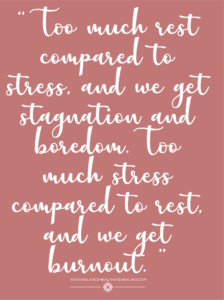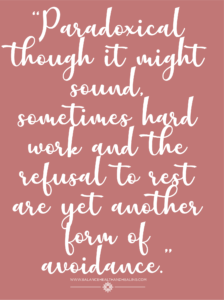 Yet, even with all these difficulties, I know the rest was vital. It did more than heal us for the next season. It let all the work of the previous season settle and sink in. It gave us much-needed distance from the grind, allowing us to evaluate how our relationships to the sport had evolved. These periods were a time to reflect and adjust. Steve Magness and Brad Stulberg summarized the findings of the science of athletic training with a simple formula: Stress + Rest = Growth. And we know now that most of the growth occurs during rest. Too much rest compared to stress, and we get stagnation and boredom. Too much stress compared to rest, and we get burnout.
Yet, even with all these difficulties, I know the rest was vital. It did more than heal us for the next season. It let all the work of the previous season settle and sink in. It gave us much-needed distance from the grind, allowing us to evaluate how our relationships to the sport had evolved. These periods were a time to reflect and adjust. Steve Magness and Brad Stulberg summarized the findings of the science of athletic training with a simple formula: Stress + Rest = Growth. And we know now that most of the growth occurs during rest. Too much rest compared to stress, and we get stagnation and boredom. Too much stress compared to rest, and we get burnout.
I have found many clients resistant to rest. There seems to be a myth that progress means keeping the pedal down and pressing on, no matter the state they’re in. They often have a vision, sometimes clear and sometimes fuzzy, of who they would like to be: a great student, spouse, athlete, or professional, perhaps with a “flawless” physical appearance. The thought of stepping back, relinquishing control, or pausing to evaluate the coherence between their values and drives feels almost sacrilegious–like a betrayal of something sacred. My brother, a professional distance running coach, calls this the No Pain, No Gain fallacy. There’s a pervasive assumption in many cultures, ours included, that one ought to get ahead and that doing so requires suffering, sacrifice, and otherworldly discipline. One of the most challenging and common parts of his job, he tells me, is getting people to do less, to rest more.
The costs of resisting rest transcend the realm of performance. They include a compromised sense of clarity and purpose in life. For example, consider the cliché of the hard-driving workaholic, so absorbed in her career that she lets important moments slip by with little care and engagement. Failing to rest, step back, or slow down means failing to contextualize our pursuits. It means failing to make a story, complete with vitality and vision, out of our lives. And it means missing the opportunity to correct our lives’ trajectory veer off course (and they all will at some point for some time)–all to maintain what is in many cases the illusion of progress. As C.S. Lewis put it, “If you are on the wrong road, progress means doing an about-turn and walking back to the right road . . . Going back is the quickest way on.” However, if we never stop to rest and take stock of our situation, we risk going further down the wrong road, shrinking the possibility of genuine progress with each step.
Speculative though it is, I wonder if some of the difficulty in resting stems from the pain of confronting squandered time. It’s easier to keep our heads down, climbing the ladder blindly, than to examine why we’re climbing in the first place. It can be especially painful to consider the possibility that we’ve been climbing the wrong ladder, prioritized the wrong pursuits. What’s more, it’s often painful just to be unsure of whether or not we’re on the right track. It stings, for example, for a competitive runner to question whether or not her sport is still right for her. Perhaps it would be better to move on, or to approach the sport more casually, during some phases of life. But that process of assessment takes work and a high degree of introspection. Paradoxical though it might sound, sometimes hard work and the refusal to rest are yet another form of avoidance.
blindly, than to examine why we’re climbing in the first place. It can be especially painful to consider the possibility that we’ve been climbing the wrong ladder, prioritized the wrong pursuits. What’s more, it’s often painful just to be unsure of whether or not we’re on the right track. It stings, for example, for a competitive runner to question whether or not her sport is still right for her. Perhaps it would be better to move on, or to approach the sport more casually, during some phases of life. But that process of assessment takes work and a high degree of introspection. Paradoxical though it might sound, sometimes hard work and the refusal to rest are yet another form of avoidance.
Uncle Iroh put it succinctly: “A man needs his rest.” On the surface, this sounds obvious. Humans can’t live more than 11 days without sleep. After a few days, most people experience some psychotic symptoms. After just one day without sleep or with inadequate sleep, we incur performance deficits across the board. But, on a deeper level, I believe the statement that a person needs rest means more. Rest is a precondition to fruitful change. It’s what allows us to gain from the work we’ve done and to pivot toward more satisfying ends. It is, in short, one of the most valuable self-allowances. And I catch myself hoping for my students, colleagues, and clients to find it in themselves to grant it more often.

